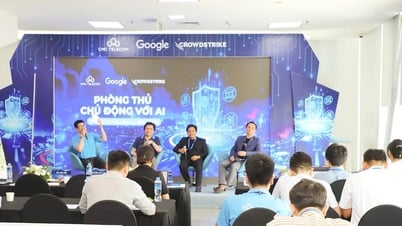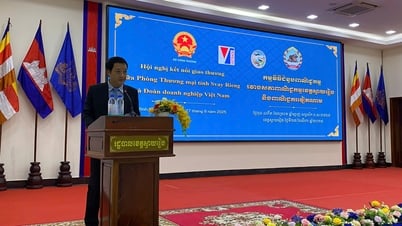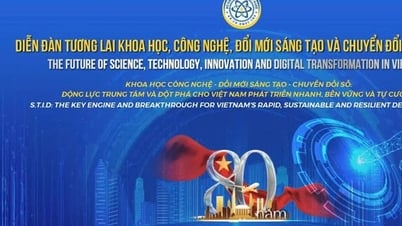Unleash your creative potential
According to ePublishing, the AI market in publishing is valued at around $2.8 billion in 2023 and is expected to reach $41.2 billion by 2033, growing at a CAGR of 30.8%.
At the 2025 Publishing Forum, Mr. Nguyen Canh Binh - Chairman of the Board of Directors of Alpha Books said that in Vietnam, each publishing unit has a different level of AI application. With Alpha Books, AI is applied to every stage. Previously, the selection of books for publication was often limited to catalogues from international publishers, manuscripts sent directly or searched on Amazon. Now, with the support of AI, Alpha Books can scan data in places where language barriers used to be a big challenge such as China, Korea, Japan. AI not only helps them monitor more closely but also evaluate the potential of works, significantly expanding the book catalog and accessing previously neglected markets.

AI is being applied in many stages of publishing. Photo: VGP
Alpha Books has just launched Alpha.AI. “Alpha.AI’s mission is not to fully automate, but to unleash human creativity, shorten the time it takes to process a manuscript from idea to completion, and help authors reach readers as quickly and widely as possible,” said Ms. Ngo Ly, Director of Alpha.AI. Currently, the platform has launched 5 services: smart translation and editing, multimedia production, writing with AI, market and reader analysis, and global publishing.
According to Ms. Ngo Ly, in the past, translating a book could take 3-6 months; with AI and a large database for AI to learn, “a book can be translated in 2 weeks, or even less”. Similarly, a traditional editor edits 300-400 pages of a book/month, but AI can significantly assist in detecting spelling errors, moras, sentence expression, and even learning different voices, in many languages. However, applying AI to translation and editing still requires selection, suitable for each type of book to ensure optimal quality.
This is a clear demonstration of how AI is transforming complex, time-consuming processes into efficient, fast operations, allowing people to focus on core values: creativity and quality control. However, Mr. Nguyen Canh Binh emphasized: “We apply AI in every stage, but it cannot replace humans. We are forced to have intelligence and understanding, otherwise AI will give us a bunch of useless information.”
Get books to the right people at the right time
Analyzing the challenges that the book industry is facing in the digital age, Mr. Tran Chi Hieu, Founder and Chairman of Orion Media, Director of the AI Center of the Vietnam Blockchain Association, pointed out that readers' reading behavior is changing rapidly: lack of concentration and preference for "super short" content; traditional long books are losing their initial appeal.
The explosion of “content junk” easily generated by AI makes it difficult for quality works to stand out. At the same time, modern readers are impatient, spending only a few seconds to decide whether to continue reading or not. They only read if the content is relevant to their personal issues, prioritizing multi-format experiences such as videos , podcasts, etc. Therefore, book covers, titles, and excerpts must be extremely attractive.

Changing the way authors create and deliver books to readers. Photo: Tapchicongsan.org.vn
Users leave “digital footprints” everywhere, and personalized advertising systems are getting smarter. If a book doesn’t reach the right people at the right time, it’s likely to be overlooked. To adapt, the book industry needs to change its approach strategy. This includes designing impressive publications, personalizing media content with concise formats, and diversifying communication methods across multiple platforms. Furthermore, personalizing reviews, building brands for authors and publishers, creating connections with the community around the work to attract and retain readers…
In that context, AI can become the key to help the book industry overcome challenges; as Mr. Tran Chi Hieu concluded: "AI does not replace books, AI helps books reach many people at the right time, in the right way".
AI is also reshaping the way readers approach and interact with content; Mr. Hoang Nam Tien, Vice Chairman of the Board of Directors,FPT University, gave an example of changes in reading habits: his generation reads fewer books but reads more carefully. In contrast, today's young generation has too many choices, leading to difficulties in choosing books to read.
“In 2 years, I wrote introductions for 13 books. I read 25 books a month, but because there were too many, I only read 5 books page by page, and read the remaining 20 books using AI." According to Mr. Tien, AI allows readers to "read with experts, read 1 book and compare it with 5 other books" and AI Agent in publishing promises to bring a more personalized and in-depth reading experience.
However, Mr. Hoang Nam Tien said: “If books only provide knowledge, then use AI to read at high speed and draw mindmaps quickly. But reading books is also to pamper our brains and ourselves. "At that time, we read each word, read to understand what the author wants to say behind the words."
Deputy Director of the Copyright Department Pham Thi Kim Oanh affirmed: readers still need books that originate from real-life situations, from human experiences and creativity. The Copyright Department is making efforts to create a legal corridor to protect unique human creations, avoiding the risk of works becoming similar and lacking originality, thereby contributing to bringing quality works to readers. |
|---|
Source: https://daibieunhandan.vn/ung-dung-ai-trong-xuat-ban-don-bay-sang-tao-ket-noi-doc-gia-10379234.html





![[Photo] Images of the State-level preliminary rehearsal of the military parade at Ba Dinh Square](https://vphoto.vietnam.vn/thumb/1200x675/vietnam/resource/IMAGE/2025/8/27/807e4479c81f408ca16b916ba381b667)

![[Photo] Parade blocks pass through Hang Khay-Trang Tien during the preliminary rehearsal](https://vphoto.vietnam.vn/thumb/1200x675/vietnam/resource/IMAGE/2025/8/27/456962fff72d40269327ac1d01426969)

































































































Comment (0)